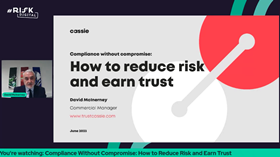Compliance Without Compromise: How to Reduce Risk and Earn Trust

Data privacy has never been more important for consumers, yet many struggle to understand what kind of data is being collected and what’s happening to it. One of our recent surveys found 80% of people are unconfident in their awareness of what information companies can access about them. Post-GDPR, many businesses implemented cookie banners and consent management platforms (CMPs), or used basic built-in functionality within their CRM platforms, to manage consent and compliance.
Catch-up and watch this session on-demand

Concepts around privacy are constantly evolving alongside consumer expectations around how companies manage their data.
Data privacy has never been more important for consumers, yet many struggle to understand what kind of data is being collected and what’s happening to it. One of our recent surveys found 80% of people are unconfident in their awareness of what information companies can access about them. Post-GDPR, many businesses implemented cookie banners and consent management platforms (CMPs), or used basic built-in functionality within their CRM platforms, to manage consent and compliance.
The problem? Many of these tools fall short of true compliance management, from substandard configuration to technical limitations. They’re not able to adapt based on multi-device preferences or handle multiple data sources across tech stacks. This leaves organizations critically vulnerable to litigation and reputational damage. Taking privacy seriously is an opportunity to reduce risk, build customer trust, and gain a competitive edge in the new privacy-focused landscape.
In this session, we’ll explore whether consumers truly trust businesses with their data and how companies can collect consent without cutting corners to earn that trust.
What you’ll learn / key takeaways:
- What consumers care about when it comes to data privacy
- How companies can win consumer trust
- Best practices to collect consent without cutting corners





